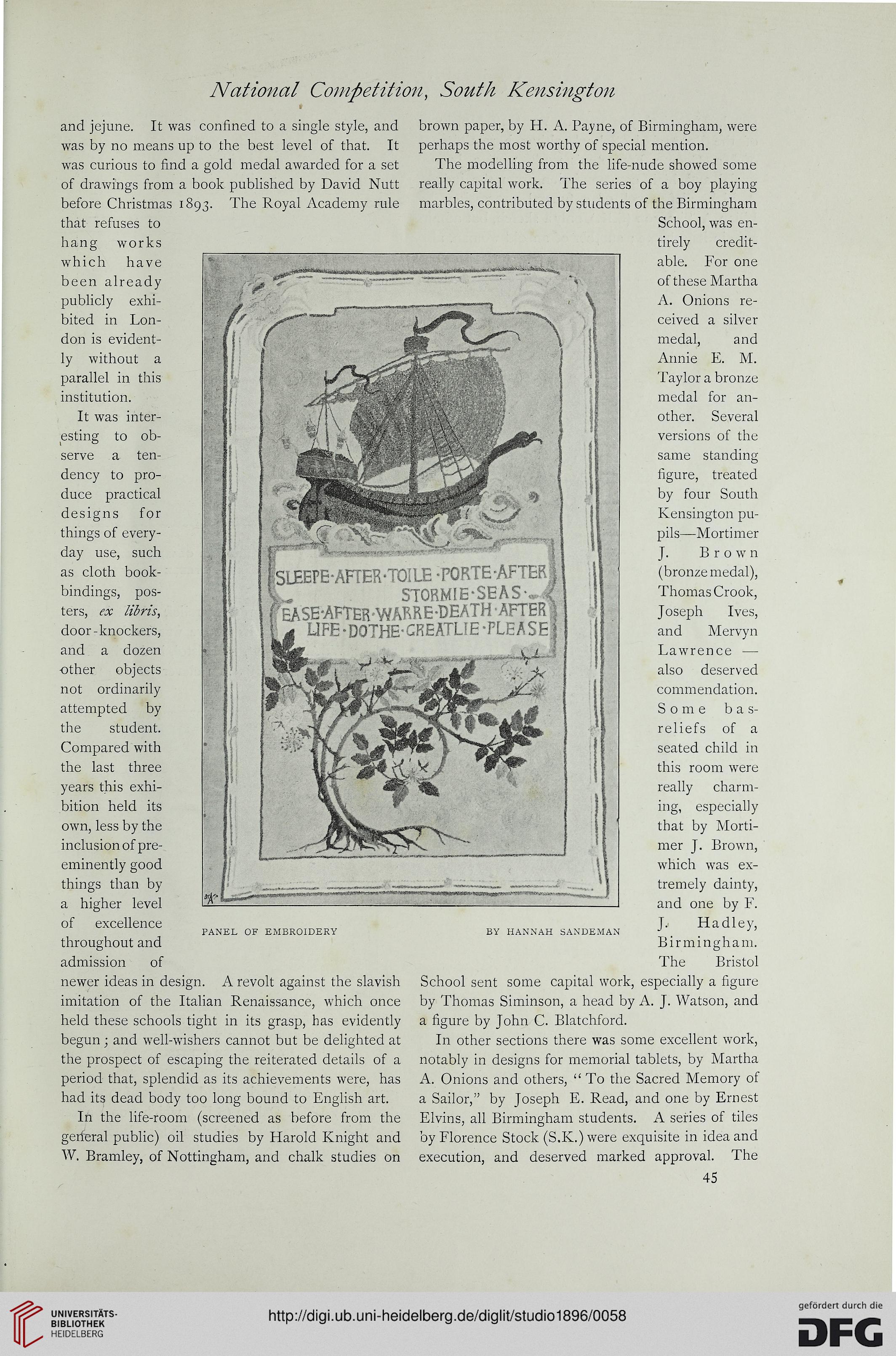National Competition, South Kensington
and jejune. It was confined to a single style, and brown paper, by H. A. Payne, of Birmingham, were
was by no means up to the best level of that. It perhaps the most worthy of special mention,
was curious to find a gold medal awarded for a set The modelling from the life-nude showed some
of drawings from a book published by David Nutt really capital work. The series of a boy playing
before Christmas 1893. The Royal Academy rule marbles, contributed by students of the Birmingham
that refuses to School, was en-
hang works tirely credit-
able. For one
which have
been already
publicly exhi-
bited in Lon-
don is evident-
ly without a
parallel in this
institution.
It was inter-
esting to ob-
serve a ten-
dency to pro-
duce practical
designs for
things of every-
day use, such
as cloth book-
bindings, pos-
ters, ex Hbris,
door-knockers,
and a dozen
■other objects
not ordinarily
attempted by
the student.
Compared with
the last three
years this exhi-
bition held its
own, less by the
inclusion of pre-
eminently good
things than by
a higher level
3PE-AFTER-TOILE -PORTE-AFTER
STORMIE-SEASv
7 EA SE -AFTER - WAR R E -DEATH • AFTER
LIFE -DOTHE-GREATLIE -PLEASE
of these Martha
A. Onions re-
ceived a silver
medal, and
Annie E. M.
Taylor a bronze
medal for an-
other. Several
versions of the
same standing
figure, treated
by four South
Kensington pu-
pils—Mortimer
J. Brown
(bronze medal),
Thomas Crook,
Joseph Ives,
and Mervyn
Lawrence —
also deserved
commendation.
Some bas-
reliefs of a
seated child in
this room were
really charm-
ing, especially
that by Morti-
mer J. Brown,
which was ex-
tremely dainty,
and one by F.
of excellence T. Hadley,
PANEL OF EMBROIDERY BY HANNAH SANDEMAN J J '
throughout and Birmingham,
admission of The Bristol
newer ideas in design. A revolt against the slavish School sent some capital work, especially a figure
imitation of the Italian Renaissance, which once by Thomas Siminson, a head by A. J. Watson, and
held these schools tight in its grasp, has evidently a figure by John C. Blatchford.
begun; and well-wishers cannot but be delighted at In other sections there was some excellent work,
the prospect of escaping the reiterated details of a notably in designs for memorial tablets, by Martha
period that, splendid as its achievements were, has A. Onions and others, " To the Sacred Memory of
had its dead body too long bound to English art. a Sailor," by Joseph E. Read, and one by Ernest
In the life-room (screened as before from the Elvins, all Birmingham students. A series of tiles
gerferal public) oil studies by Harold Knight and by Florence Stock (S.K.) were exquisite in idea and
W. Bramley, of Nottingham, and chalk studies on execution, and deserved marked approval. The
45
and jejune. It was confined to a single style, and brown paper, by H. A. Payne, of Birmingham, were
was by no means up to the best level of that. It perhaps the most worthy of special mention,
was curious to find a gold medal awarded for a set The modelling from the life-nude showed some
of drawings from a book published by David Nutt really capital work. The series of a boy playing
before Christmas 1893. The Royal Academy rule marbles, contributed by students of the Birmingham
that refuses to School, was en-
hang works tirely credit-
able. For one
which have
been already
publicly exhi-
bited in Lon-
don is evident-
ly without a
parallel in this
institution.
It was inter-
esting to ob-
serve a ten-
dency to pro-
duce practical
designs for
things of every-
day use, such
as cloth book-
bindings, pos-
ters, ex Hbris,
door-knockers,
and a dozen
■other objects
not ordinarily
attempted by
the student.
Compared with
the last three
years this exhi-
bition held its
own, less by the
inclusion of pre-
eminently good
things than by
a higher level
3PE-AFTER-TOILE -PORTE-AFTER
STORMIE-SEASv
7 EA SE -AFTER - WAR R E -DEATH • AFTER
LIFE -DOTHE-GREATLIE -PLEASE
of these Martha
A. Onions re-
ceived a silver
medal, and
Annie E. M.
Taylor a bronze
medal for an-
other. Several
versions of the
same standing
figure, treated
by four South
Kensington pu-
pils—Mortimer
J. Brown
(bronze medal),
Thomas Crook,
Joseph Ives,
and Mervyn
Lawrence —
also deserved
commendation.
Some bas-
reliefs of a
seated child in
this room were
really charm-
ing, especially
that by Morti-
mer J. Brown,
which was ex-
tremely dainty,
and one by F.
of excellence T. Hadley,
PANEL OF EMBROIDERY BY HANNAH SANDEMAN J J '
throughout and Birmingham,
admission of The Bristol
newer ideas in design. A revolt against the slavish School sent some capital work, especially a figure
imitation of the Italian Renaissance, which once by Thomas Siminson, a head by A. J. Watson, and
held these schools tight in its grasp, has evidently a figure by John C. Blatchford.
begun; and well-wishers cannot but be delighted at In other sections there was some excellent work,
the prospect of escaping the reiterated details of a notably in designs for memorial tablets, by Martha
period that, splendid as its achievements were, has A. Onions and others, " To the Sacred Memory of
had its dead body too long bound to English art. a Sailor," by Joseph E. Read, and one by Ernest
In the life-room (screened as before from the Elvins, all Birmingham students. A series of tiles
gerferal public) oil studies by Harold Knight and by Florence Stock (S.K.) were exquisite in idea and
W. Bramley, of Nottingham, and chalk studies on execution, and deserved marked approval. The
45




